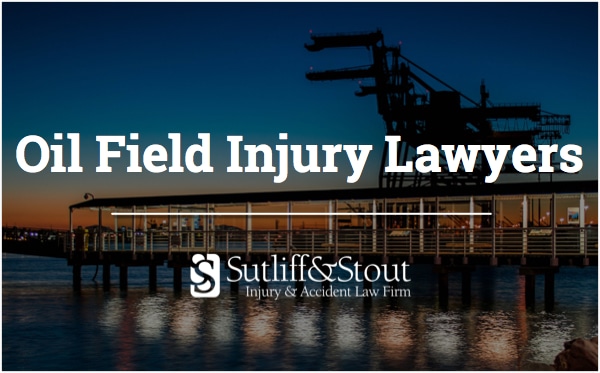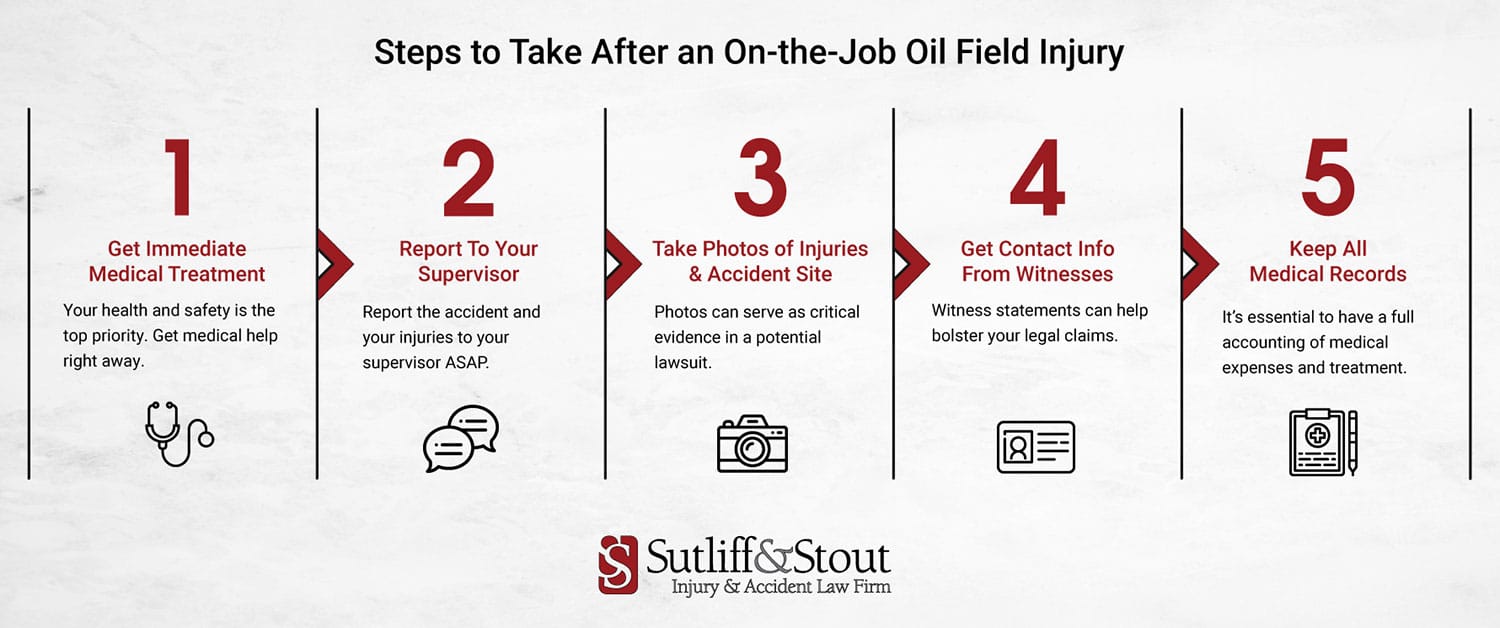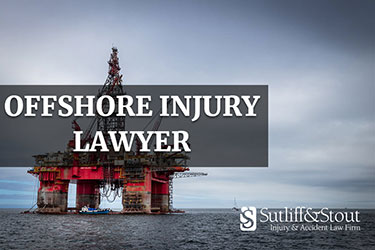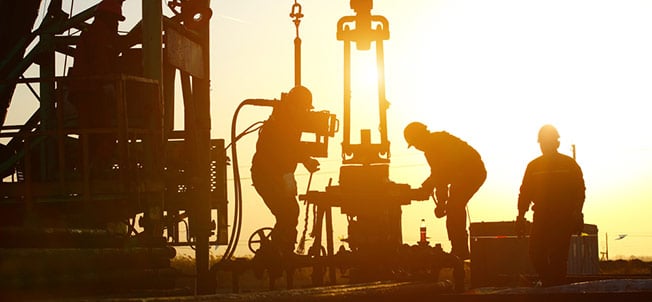Understand whether you should contact an oil field injury lawyer to help you seek damages after an accident.

The United States has become one of the largest producers of oil in the world, and much of that oil production happens right here in Texas.
Thousands of Texans earn their living working these oil fields.
Yet some companies don’t employ basic safety standards, fully train workers, and most don’t take responsibility when things go wrong.
This has contributed to a disturbing statistic showing that oilfield workers are 7 times more likely to suffer fatal injuries on the job than in other professions.
The Most Common Oilfield Injuries in Texas
The following types of injuries frequently occur as a result of dangerous working conditions in the oil and gas industry:
- Head and brain injuries: concussions, traumatic brain injuries, skull and facial fractures, and facial lacerations.
- Neck and back injuries: spinal cord injuries, severed spinal cords, pinched nerves, herniated or ruptured discs, broken vertebrae, whiplash, and paralysis.
- Bone injuries: Broken bones, shattered bones, hairline fractures, compound fractures, and dislocated bones or joints.
- Limb and extremity injuries: partial amputation; total amputation; crushed limbs; and temporary or permanent damage to the functionality of arms, legs, feet, hands, fingers, or toes.
- Soft tissue injuries: tearing of muscles, tendons, and ligaments; sprains; and strains.
- Burns: first-degree burns, second-degree burns (partial-thickness burns), third-degree burns (full-thickness burns), blistering, and scarring.
- Skin injuries: lacerations, chemical burns, frostbite, cuts, punctures, and bruises.
Workers who suffer any of these injuries may be entitled to compensation by their employer or other responsible parties. An oil field accident lawyer can help determine who is responsible for your injuries and how much compensation you deserve.
Injured on the job in an oilfield accident?
If you’ve been injured on the job, you need an oil field injury attorney who understands how companies and their insurers operate when one of their employees is injured. At Sutliff & Stout, we have over a decade of experience helping injured oilfield workers recover millions in damages. If you’ve suffered an injury on the job, give us a call at (713) 987-7111 or complete the short form below for a free consultation.
The Different Types of Oil Field Accidents
There are many types of accidents that occur in the industry and, in most instances, an injured worker has the right to be compensated for his or her injuries and resulting damages. The following are some of the more common types of accidents that we deal with at Sutliff & Stout:
Heavy Equipment Failures
On any drilling site, workers are required to operate dangerous heavy equipment whether they are drilling, pulling pipe, mixing mud or performing one of the many other jobs required of them. Sometimes this equipment fails causing significant injuries.
These failures happen for a number of reasons, including improperly trained or inexperienced hands, mechanical failures caused by overstress, inadequate maintenance, or careless safety inspections. Sometimes, failures result from a design or manufacturing defect.
The law requires that heavy machinery on job sites be safe for workers to use and that such equipment be properly maintained to prevent accidents. Also, workers who are required to operate heavy machinery should receive adequate operational training and safety training so as not to put others at risk.
If you were injured by a heavy equipment failure, you might be entitled to financial compensation for your injuries in addition to any worker’s compensation benefits you receive through the insurance claim process.
Depending on the nature and cause of your accident, you might be able to recover money from a third party, such as the company that designed and manufactured the heavy equipment.
Fires and Explosions
Oil and gas industry workers must deal with the risk of fire or explosion at work sites. Wells, trucks, tanks, and other heavy production equipment can release flammable gases and vapors that can be ignited by open flames, static electricity, friction, or other heat or electrical sources.
Pressure buildup is also a significant area of concern for anyone working in and around a well site location. A fire or explosion at an oil field can cause serious injuries to workers and may even be fatal. If you were injured as a result of a fire or explosion, you may have a claim for damages against the person or company responsible.
Well Blowouts
A well blowout is the uncontrolled release of crude oil or natural gas during the drilling process. These blowouts are typically the result of failures in pressure control systems in wells. Even though modern oil wells contain blowout preventers that are designed to reduce the risk of a blowout, these types of accidents still occur. An accidental spark or contact with an ignition source during a blowout can lead to a catastrophic oil or gas fire.
If you were injured at an oil or gas extraction site as a result of a well blowout, you may be entitled to compensation for your injuries and other losses. Investigations into these complex accidents can take several years, and workers who have been injured in a well blowout often face long delays in being issued compensation.
A lawyer can help you identify who is responsible for a well blowout, and can help you obtain money damages for your injuries and other losses associated with your accident.
Fracking Accidents
Hydraulic fracturing (or “fracking” as it is commonly known) has reinvigorated the US oil and gas industry and has produced billions of dollars in revenue for Texas oil companies. But fracking, which involves the high-pressure injection of water or a fluid mixture into a borehole to create cracks in deep-rock formations through which gas or petroleum can flow, is inherently dangerous.
Serious accidents and chemical spills at fracking sites are becoming more commonplace, and workers often suffer devastating injuries as a result of these accidents.
Truck and Vehicle Accidents
Oil and gas workers are often injured as a result of truck and vehicle accidents at or near work sites. Single-car overturns, collisions with other work site vehicles, and collisions with stationary objects, like heavy equipment, are common causes of injuries to oil and gas workers.
A number of factors may contribute to vehicle accidents at a drilling site, including poor driving conditions, driver fatigue, drug and alcohol use, and improperly maintained vehicles.
Accidents involving cars, trucks, or other vehicles at an oil or gas extraction site present a number of challenging legal questions. It can be difficult to determine who is responsible for the accident and whose insurance company should be responsible for paying for any injuries as a result of the accident.
There are additional questions about the role of worker’s compensation insurance and whether negligence or recklessness played a part in the accident. An oil field accident lawyer can help you address these questions after a truck or vehicle accident at a job site, and can help you determine what your legal options are.
Slips, Trips, and Falls
Injuries caused by slips, trips, and falls are common in the oil fields and at other oil and gas extraction sites. Oil field workers are often forced to work long hours in challenging outdoor environments, which increases the chances of a slip or a trip.
Moreover, many petroleum and gas extraction workers are required to access platforms and equipment that are located high above the ground. Although employers are required under Occupational Safety and Health Administration (“OSHA”) regulations to ensure that walking surfaces are safe and to prevent falls from elevated equipment, slips, trips, and falls are among the most common causes of serious and fatal workplace injuries and deaths.
If you have suffered a slip, trip, or fall at an oil or gas extraction site, an experienced workplace accident lawyer can help determine whether your employer may have failed to take adequate precautions to prevent your injuries.
Work in Confined Spaces
Workers are often required to enter confined spaces, such as storage containers and storage tanks. There are a number of workplace safety hazards associated with confined areas, such as asphyxiation, crushing accidents, exposure to dangerous levels of hazardous chemicals, and ignition of flammable vapors or gases.
Without proper training, equipment, and procedures in place, oil field workers can get seriously injured in confined spaces at job sites. In some cases, your employer may be required to obtain a written permit to require work in a confined space and comply with guidelines established by OSHA, the federal agency responsible for ensuring safe workplaces for Americans.
I Was Injured at My Job in the Oil Industry. What Should I Do?

As soon as the injury occurs, you should report it to a supervisor and ask to seek immediate medical treatment.
If your employer’s insurance company gives you a hard time about treatment, you can recruit the aid of a personal injury attorney who is familiar with oilfield injury cases.
Generally speaking, you can also pursue damages against the company that injured you when they are shown to have been negligent. There are some exceptions to this rule so we suggest you contact a qualified oilfield injury lawyer in Texas to evaluate your particular situation.
If the at-fault company is using outdated equipment, subcontracting jobs to unskilled workers, or have failed to implement basic workplace safety standards, then you may be able to hold them responsible for your injuries.
In addition, there may be another party who is responsible. For instance, the manufacturer of the machinery that your company uses may have created a defective product. In that case, you can sue the company that manufactured your company’s equipment.
Oilfield Accident & Injury Questions Answered Here
Not ready to speak with a qualified oilfield injury lawyer? Read on to gain a better understanding of your best course of action.
- I Was Injured at My Job in the Oil Industry. What Should I Do?
- How Do I Know if I Should Hire an Oil Field Injury Lawyer?
- How Long Do I Have to Contact an Oil Field Injury Attorney?
- Do I Need an Attorney with Specific Experience Handling Oilfield Injury Cases?
- On What Grounds Can My Company’s Insurance Deny My Claim?
- What are Common Offshore and Oilfield Injuries That Result in Legal Claims?
- What are Common Types of Oilfield Accidents that Result in Legal Claims?
- How long does the claims or lawsuit process take?
- How is Legal Responsibility Determined in an Oilfield Accident Cases?
- How Do I Know If I Have a Strong Oilfield Injury Case?
- Get a Free Case Review from an Oil Field Injury Attorney Now
How Do I Know if I Should Hire a Texas Oil Field Injury Lawyer?
The general rule of thumb is that the more serious your injuries are, the greater the need for a personal injury lawyer. The claims process is not easy.
It should be, but most companies desire to put profit over the person causes unnecessary red tape and unfair treatment to those who do not have the proper representation.
Furthermore, insurance companies are for-profit entities. Every claim against their policy eats into their profit margin. They are incentivized to try to pay as little as possible on your claim.
How does this happen? There are a number of different ways an insurance company can avoid paying out on a claim.
Often, they will try to say that the accident was your fault or the fault of someone else. They can do this because, at this point, they’re holding all the cards. They have the money and you need them to honor your claim.
Even when your employer or their insurance company conducts an investigation into the accident, they have been known to suppress evidence that indicates their own fault or responsibility.
Your recourse in this matter is an attorney who is advocating for your interests. If you hire the right attorney, he or she will conduct an independent investigation and gather evidence to hold the proper party responsible.
One reason the insurance company wants to blame you for the accident is that Texas applies a comparative fault state. Comparative fault or comparative negligence is when the jury is asked to determine who all is to blame for an accident that results in an injury.
In Texas, if the plaintiff is found to be 51% or more at fault then he or she gets nothing. The entire battle is thus over where the blame lies – with you or with the company.
How Long Do I Have to Contact an Oil Field Injury Attorney?
The statute of limitations in Texas for personal injury claims is two years. Logistically, you should contact a qualified personal injury attorney as soon as possible after your accident.
It keeps everything fresh in your mind and gives those who might have reason to lie or bury evidence less time to get their stories straight.
Do I Need an Attorney with Specific Experience Handling Oil Field Injury Cases?
You do. The reason for that is that oilfield workers work in a highly specialized industry and there could very easily be several liable parties. On top of that, oilfield companies will conduct internal investigations but those cannot be relied upon to be accurate. An independent third-party evaluation is absolutely crucial to determining the cause of your oilfield accident.
We have seen many cases in which oilfield companies have buried evidence of wrongdoing and maliciously blamed employees for accidents they were not responsible for. We will conduct our own investigation, determine what we believe occurred and bring claims against those responsible for your injuries.
FEATURED CASE RESULT
$1,500,000.00
Settlement on behalf of Oil Field Rough Neck
Our client injured his knee when a section of casing was rolled into his leg. The client required a full knee replacement due to the already poor condition of his knee. Defendants argued that the client’s prior knee problems were the cause of his problems. Through various depositions and other efforts, we were able to demonstrate that the client’s problems stemmed from the collision and that his prior problems were not related. Through our efforts we were able to achieve a significant settlement that netted the client $822,394.00, as well as the payment of over $48,000.00 in medical expenses.See more examples of results we’ve achieved for our clients…
On What Grounds Can My Company’s Insurance Deny My Claim?
Injury settlements in oilfield accidents tend to be large. Workers end up with severe permanent scarring from burns, amputated limbs, paralysis, and a spine-related injuries. These injuries can make it difficult for you to return to work.
In other words, you can lose your ability to support yourself and your family. The stakes are incredibly high for you.
They are also high for your employer and their insurance company. The insurance company stands to potentially lose a large sum of money and your company exposes itself to other lawsuits, higher insurance costs, and potential liability should they be found negligent.
This is one of the many reasons the company’s own internal investigation cannot always be trusted. They will attempt to lay the blame at your feet.
What are Common Offshore and Oilfield Injuries That Result in Legal Claims?
Some of the most common offshore and onshore oilfield injuries include:
- Traumatic brain injury
- Spinal injuries
- Broken bones
- Burns
- scarring and disfigurement
- Knee and hand injuries
The vast majority of injuries that occur are easily prevented by implementing basic safety standards and adequately training employees. In the majority of cases, when something goes wrong it’s because the oil company did not adequately devote resources to ensure workplace safety.
Why are Injuries So Prevalent for Oilfield and Offshore Workers?
There are a number of reasons why oilfield workers are 7 times more likely to die on the job than other workers. The same reasons account for the high volume of employees who are injured on the job. These include:
- Lack of proper training and supervision,
- Lack of safety equipment,
- Outdated industrial equipment.
What Types of Oilfield Accidents Most Commonly Result in Legal Claims?
In our practice, we’ve seen a number of clients who have been injured in all of the following oilfield or offshore accidents:
- Pipeline explosions,
- Pipe related incidents
- Chemical burns
- Trucking accidents
- And well blowouts.
In addition, oilfield workers are at increased risk for other mundane workplace accidents including:
- Work-related vehicle accidents,
- Poorly maintained worksites,
- Electrical malfunctions,
- Falls,
- Malfunctioning or poorly maintained equipment.
How long does the claims or lawsuit process take?
The answer to this question depends on the nature and severity of your injuries. Most cases can be resolved or tried within a year or year and a half of when you decide to hire a lawyer. Some cases take longer because the client has extensive injuries or the nature of the incident is more complex.
While you want to move quickly, it is important not to rush the process. If you were injured, this will be your only opportunity to be compensated so it is important to fully understand the nature of your injuries and how those injuries will affect you down the road.
How is Legal Responsibility Determined in an Oilfield Accident Cases?
There are a number of complexities when determining legal responsibility in an oilfield accident.
First, if your employer or co-worker is a fault for the injury, you must determine if you are covered by workers’ compensation. If not, are you subject to a company plan that requires arbitration. This area of the law is quickly changing as companies seek out other ways to increase their profit margins so be sure to find a lawyer that understands the complexity of your particular claim.
In some instances, neither you nor your employer is responsible for your injuries. It could be the result of defective machinery or some other third party. In this case, you can file a third-party claim against the negligent party.
How Do I Know If I Have a Strong Oilfield Injury Case?
The best way to determine if you have a case is to contact an oilfield injury attorney. Even when your company honors your workers’ compensation claim, you may have cause to bring a claim against some other third party that caused or contributed to your injuries.
If your company does not have workers’ compensation insurance then, in some instances, you can also initiate a lawsuit against your employer to recover damages. In addition, if the faulty design of equipment that your company was using is responsible for your injuries, you can assert a product defect claim against the company that manufactured the product.
It remains true, however, that your best course of action is to talk to an oilfield injury attorney. At Sutliff & Stout, our consultations are free and we work on contingency. That means we don’t charge you attorney fees unless we win.
Get a Free Case Review from a Texas Oil Field Injury Attorney Now
The oilfield injury lawyers at Sutliff & Stout have successfully litigated most types of oilfield injury lawsuits. We have helped our clients get treated fairly and have held at fault companies responsible for their actions.
If you’ve been injured, it’s imperative that you contact an experienced Texas oilfield attorney today. Our consultations are free. Give us a call and we will begin working on your case immediately.
- What is a Catastrophic Injury? - January 30, 2025
- Essential Guide for Pedestrians Hit by Cars in Texas - January 30, 2025
- How to File a Wrongful Death Lawsuit in Texas - January 15, 2025



 (713) 405-1263
(713) 405-1263  550 Post Oak Blvd, Suite 530
550 Post Oak Blvd, Suite 530